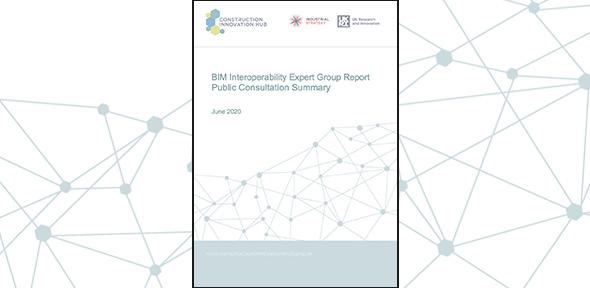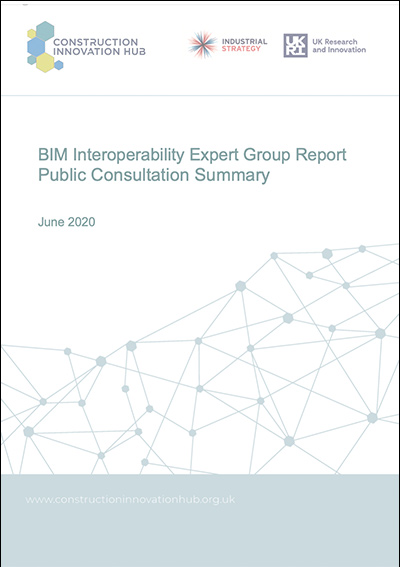
The Centre for Digital Built Britain (CDBB), a partner of the Construction Innovation Hub (CIH) responsible for delivering the Government’s Building Information Modelling (BIM) programme and facilitating collaboration with industry, has published a summary report following the public consultation on the CDBB’s BIM Interoperability Expert Group (BIEG) Report launched back in April 2020.
This latest publication presents the summary of public responses to the BIEG’s Report which was launched for consultation on 17th April 2020. The report was the result of an extensive review, led by BIEG’s committee, in which they met with 21 representative organisations to gather evidence, and make considered recommendations, to Government from industry, on how best to support and develop the existing ‘BIM Mandate’ in such a way as to make it accessible and beneficial to all. These recommendations, referred to as ‘recommended enablers’ were then opened to public consultation, by the CDBB, and the responses compiled into a summary report.
The public consultation responses included input from:
- Academia
- Industry
- Non-governmental or representative professional bodies
- Non-departmental public bodies
The majority of responses showed positive support for the recommended enablers set out within the BIEG’s Report, with 100% of respondents agreeing with the recommended approach to support the further development of Industry Foundation Classes (IFC), and also agreeing the importance of Asset Information Model (AIM) Common Data Environment (CDE) to achieving the beneficial outcomes of Interoperability. 100% of respondents also agreed with the BIEG that there is a need for a greater understanding by owners/operators, in order to drive procurement of interoperable data as a strategic asset.
Overwhelming support (ranging from 74%-94%) was expressed for the BIEG’s further recommended enablers including:
- Classification Schema Alignment
- IFC and COBie – Practical Application & Development
- Education & Skills
- Standards (review of standards landscape)
Keith Waller, Programme Director of the Construction Innovation Hub said:
“We were very pleased by the level of response, and obvious interest and support in the topic of BIM Interoperability and its potential for positive impact on the future of the built environment. Our aim is to deliver an interoperability programme that addresses the issues and challenges raised as a result of the public consultation and we remain committed to broad collaboration and industry engagement as a means of delivering a solution that benefits all.”
Fiona Moore, BIEG Chair said:
The support for the recommended enablers set out in the BIM Interoperability Expert Group Report has been extremely encouraging – not only that there was overwhelming agreement with our proposed approach, but that there is such interest in the programme and willingness to collaborate on it. We would like to thank those who responded to the call for public consultation for their input and look forward to further collaboration in the future.
Professor Andy Neely OBE, Director of CDBB and Pro-Vice-Chancellor for Enterprise and Business Relations at the University of Cambridge said:
As the recognised benefits of Interoperability within the built environment are becoming more widely acknowledged across industry, there is an increasing interest in collaboration on the programme and that is something we welcome with great fervour. Enabling the industry to make faster, more efficient and reliable decisions as a result of using more reliable information, and providing seamless procurement of information between asset owners over the lifetime of the asset are the type of positive developments that will help cement the UK’s position as a global leader in productivity.
The full summary document is available to download and review here. If you have any further questions regarding the public consultation or resulting summary document please contact Alanna Gluck, Policy & Public Affairs Manager at alanna.gluck@cdbb.cam.ac.uk.
BIM Interoperability – For the purposes of the Report, the BIEG has adopted the following definition of interoperability: ‘the ability of two or more systems to exchange information and to use the information that has been exchanged.’ This definition is adapted from the one contained in ‘ISO/TS 27790:2009, Health informatics— Document registry framework’.

